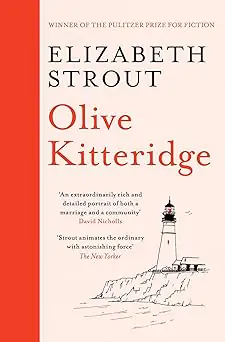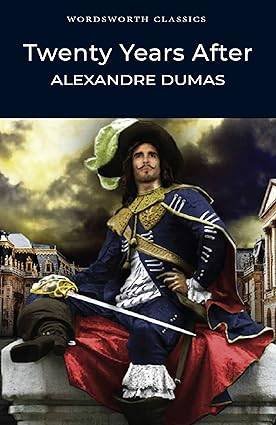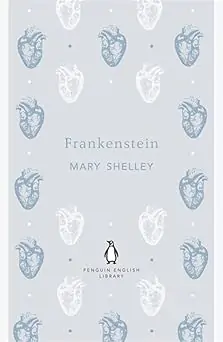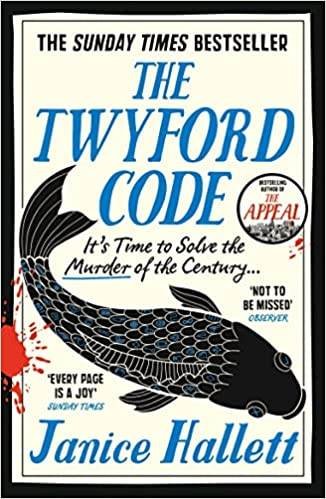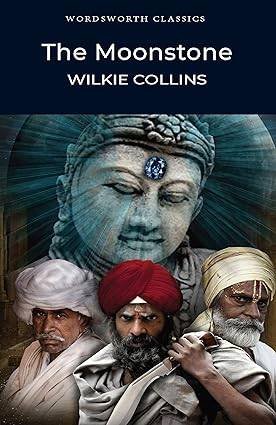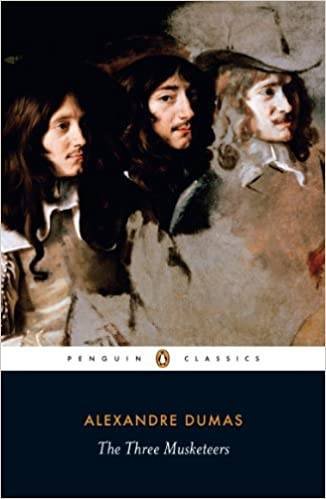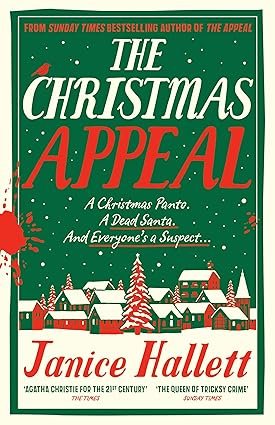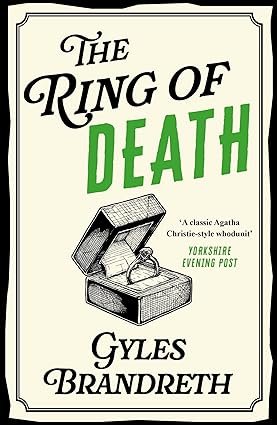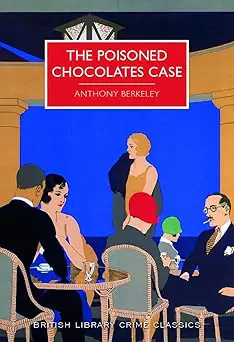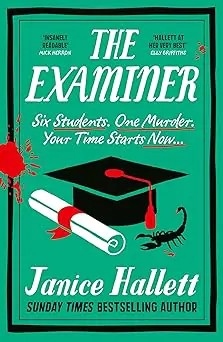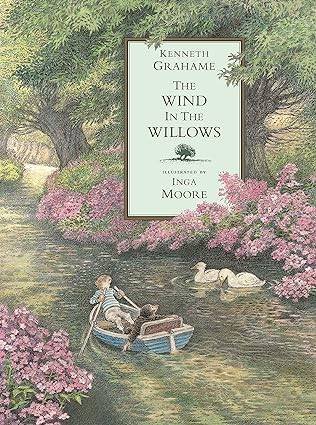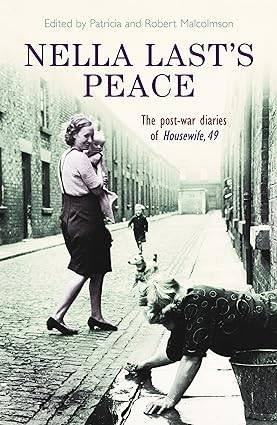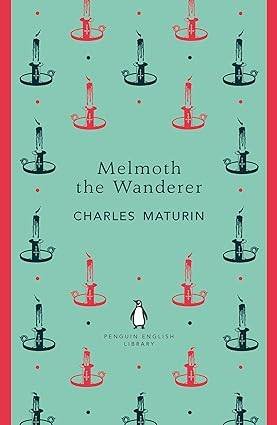Home » Book Reviews » Alexandre Dumas » The Count of Monte Cristo by Alexandre Dumas
Possible spoilers ahead
I’ve been meaning to read this book for a while as I’ve gradually realised that there are lots of other stories which reference the prison escape from this book, so I thought it would be interesting to read the book with the original idea. Grab your copy and let’s read it together!
Edmond Dantes arrives home to Marseilles in 1815 as part of a ship’s crew, the ship is owned by Morrel. The captain of the ship, Leclere, died on the way to Marseilles and Dantes became the temporary captain of the ship. Leclere had asked Dantes, as a dying wish, to stop at Elba, where Napoleon is banished, to drop off a parcel and collect a letter from there, which Dantes did with no further knowledge of the contents of the parcel or letter. When they arrive at Marseilles, Morrel strongly hints that he’d be happy for Dantes to retain the position of captain, though this makes another member of the crew, Danglars, very jealous. Now he is home, Dantes arranges to marry his fiance, Mercedes, which makes her cousin, Fernand, very jealous as he was hoping to marry her. Hmmm, there’s a lot of jealousy and vindictiveness very early on in the book, and I feel this doesn’t bode well for Dantes! And Elba is mentioned, where Napoleon is, I remember that from my history lessons at school.
Fernand and Danglars meet in a bar and discuss their mutual hatred of Dantes. Another man, Caderousse, is with them but not part of their discussion and is heavily drunk though does listen to their conversation together about Dantes. Fernand and Danglers decide to write an anonymous letter to the authorities saying that Dantes suspiciously stopped at Elba and collected a letter from Napoleon. Dantes is then arrested on the day of his wedding. The person investigating him, Villefort, feels at first that Dantes should be freed, but then reads the letter that Dantes had brought back from Napoleon and realises that this letter implicates his father, Noirtier, who is a known sympathiser of Napoleon, so Villefort is worried this will damage his own reputation and he therefore destroys the letter and commits Dantes to prison, altering his record to show him as a Napoleon sympathiser and that he’s dangerous and needs to be kept in solitary confinement. Omg, poor Dantes! Such complicated scheming and plotting between so many people, the detail of it all is wonderful to read and to see unfold but poor poor innocent Dantes, he’s just a powerless victim of others’ jealousy (Fernand and Danglars) and self-preservation (Villefort)!
Dantes is in prison for 14 years, nearly losing his mind and at times contemplating suicide. He then makes contact with another prisoner, Abbe Faria, and this friendship enlivens Dantes and he is also educated by Faria. They plan an escape but Faria then falls sick and dies, and at the last moment Dantes realises that he can escape the prison by pretending to be Faria’s dead body. He is thrown from the prison walls into the sea and swims to an island where he is picked up by smugglers. Omg, wow, what a clever and outrageous and audacious and original idea! I can see why this storyline is loved and admired by other authors and how they have been keen to use it themselves and reference it in their stories, it was referenced and indeed copied by the characters in Carlos Ruiz Zafon’s Prisoner of Heaven book, which is what first tempted me to read The Count of Monte Cristo, and I can even see aspects of it in JK Rowling’s Harry Potter And The Goblet of Fire with Barty Crouch Jnr escaping prison by his dying mother taking his place. And it was so tense to read with the daringness of it, my heart was in my mouth throughout, fearful that Dantes would be discovered and stopped. Wow, this is a fantastic plot device, I am full of admiration!
Dantes was told by Faria about a huge treasure concealed on the Island of Monte Cristo, which he finds and is then rich. He then determines to wreak revenge on the people who caused him to go to prison, he sees this revenge as God’s providence and himself an agent of it. He returns to the mainland and firstly visits Caderousse, disguising himself as Abbe Busoni. Caderousse is poor and struggling, with his pub business failing, and Dantes (as Abbe Busoni) offers to help him by giving him a huge diamond providing Caderousse tells him the story of Danglars’ and Fernand’s deception, which Caderousse does. He also tells him how Dantes’ father has since died penniless and starving, and that he had refused help from Morrel and that Morrel afterwards left a red silk purse of money on Dantes’ father’s mantlepiece to provide the funds for a decent burial for him after he died. Dantes realises that Caderousse wasn’t really involved in the deception which resulted in his imprisonment, and in fact had also tried himself to help Dantes’ father. Dantes then goes to Morrel, disguising himself as a clerk from a bank, and learns how Morrel repeatedly pleaded for Dantes’ release and stated his good character. Dantes also learns that Morrel is about to be declared bankrupt with his shipping business, so helps him with money, leaving this in the red silk purse he got from Caderousse and putting this on the mantlepiece of his father’s old apartment and instructing Morrel’s daughter to collect it, in a letter he writes to her signed ‘Sinbad the Sailor’, and he also arranges for a replacement ship for Morrel. He also refers to himself at this time as acting for Lord Wilmore. Phew, I’m pleased he helped Morrel, though he did leave it right to the wire, I feel, as Morrel was about to commit suicide in his despair, I really think Dantes could have intervened sooner here, it almost felt like he was punishing Morrel before he helped him! And Dantes is very good at disguises! But ooooh, what a determined and revengeful person he seems now, I’m quite relieved that the first two people he has visited weren’t actually bad to him or caused him harm as it really feels like he will be very vindictive in his aim of revenge, I am almost apprehensive of when he does visit someone who has actually done him harm! Obviously he was extremely hard-done-to and the ones who caused that deserve some kind of punishment, but I’m not sure if the revenge Dantes feels is actually consuming him and causing him harm. But then again, I guess he has had many years to sit and think about this and get angrier and angrier about how unjustly he was treated. But, shiver, he seems capable of almost anything!
Franz d’Epinay and Albert Morcerf, two rich young men, visit Rome where they meet the Count of Monte Cristo (Dantes). They also learn about the bandits in Rome, particularly Luigi Vampa who the Count has influence with. Albert is engaged to Danglars’ daughter, Eugenie, and is friends with Morrel’s son, and his parents are Mercedes and Fernand, and the Count is taken to their home. Hmmm, I was a bit confused by this long section with Franz and Albert, I couldn’t understand why we’d left the Count (I guess I should call him this now, rather than Dantes) on his mission of revenge, I was getting a little impatient actually as this section just seemed far too long and unneeded, I was wondering if Franz was actually Fernand and this was the Count engineering a meeting with him to then exact his revenge, but as we got to know Franz more then that didn’t seem to fit. I do like Albert though, and was amused by his breakfast chat with his friends. And Albert being Mercedes’ and Fernand’s son was a surprise, and I began to wonder if it was a surprise to the Count too and to worry that the knowledge that Mercedes had married Fernand would make him angry and revengeful to her too, and I was also thinking that Dumas was employing a Charles Dickens-like coincidence, tee hee, by having people meet in a vast city who happen to have a connection to each other, but having just looked back again at Caderousse’s recital to the Count (as Dantes), I see that Caderousse told him then that Mercedes and Fernand married and that they had a son called Albert, and he gave him their address too, ooops, that was my failing to notice that information at the time and apologies to Dumas for doubting his storytelling, as obviously now I see that meeting Franz and Albert has all been contrived by the Count in order to gain access to Mercedes and Fernand, clever, clever, clever!! Though wow, the Count is quite prepared to play the long game as that still seems quite a convoluted way to gain access to them, and he also spent quite some time getting to know Franz and Albert in order to achieve this, hmmm, sneakiness and deviousness and intricate plotting. I love it! And to concentrate a little on the Count, where does his vast knowledge come from and his manners of nobility? I know he was taught by Faria and I guess they had a lot of time to do this, but it seems a lot for him to have learnt in prison not knowing he’d need all this information. Or perhaps he was planning everything, such as the life he’d lead as the Count of Monte Cristo, in that great detail even back then (when I said the ‘long game’, this would be the long long long long long game, tee hee, but I am beginning to believe he is capable of that!). Or perhaps he has learnt more since he escaped from prison. But just considering his background of being a poor sailor and then a jailed man, the transformation into the Count is huge, and not just appearance-wise but conversation-wise and confidence-wise too. And talking about his appearance, he certainly seems a little odd (!), he is described as almost vampire-like with a pale complexion, he barely eats, and he seems to shudder when he touches Albert’s hand. And of course no-one recognises him as Dantes which I struggle to believe, obviously he is excellent at disguises and I guess he is 14 years older and having suffered in jail and often been in solitary confinement, then all this is bound to cause changes in a person’s physical appearance. Though Mercedes seems to suspect something by his voice.
The Count’s steward, Bertuccio, relates to him the story of his own life. He says that his brother was murdered but that Villefort refused to investigate this so he killed Villefort as vengeance for his brother, and that when he killed Villefort, that gentleman’s mistress had just given birth so Bertuccio also stole this child, who was wrapped in a blanket that had the initials H and N and a baronet’s coronet on it, and Bertuccio and his sister then raised this child, calling him Benedetto, but he turned out bad, killing his (adopted) mother after she refused to give him money, and Bertuccio hasn’t seen Benedetto since. Bertuccio also says that he witnessed Caderousse selling the diamond (that the Count had given him) to a jeweller and then killing that jeweller to get the diamond back and that Caderousse is now jailed for this crime. Wow, that’s a lot to be introduced into the story! And there I was again thinking that this was a coincidence for the Count to hire a man who had been involved with people from the Count’s past, but yet again I am not allowing for how devious and long-planning the Count is as it now occurs to me that the Count probably knew Bertuccio’s history and this is why he hired him, as when I flick back again through Bertuccio’s section he said he had related his history to the priest, Abbe Busoni, which (silly me for forgetting!) was the identity that he used when he questioned Caderousse so he must have used it again to question more people. Wow, it is beginning to feel slightly sinister with just how much knowledge the Count has about everyone, and also how many identities and disguises he can adopt, if I was being hunted by him I would be terrified, he seems all-conquering and like nothing will ever defeat or stop him, shiver, he really does quite scare me even though a part of me still feels sorry for him with everything he has gone through, but eeek, he is just relentless and remorseless! And I wonder if the Count will also search for Villefort’s mistress and son now and wreak the revenge on them that he can’t now wreak on Villefort as he is already dead. And I’m intrigued by the initials and the baronet’s coronet on the child’s blanket as that makes me wonder who Villefort’s mistress actually was, as Danglers’ wife has the initial H and her first husband was Marquis of Nargonne so is this the N, or alternatively could Villefort then have married his mistress as his current (second) wife has the initial H too? There seems to be a few hints that it could have been Danglars’ wife who was the mistress which would add even more intrigue and spice to this whole story and the characters! And I am also wondering (what a wonderful book this is for making me wonder!) if when the Count visited Caderousse he foresaw what he would be tempted to do, ie sell the diamond and then steal it back from the person he’d sold it to so he would greedily end up with both the diamond and the money for selling it (and perhaps the Count even foresaw him killing too to get the diamond back), and so was this the Count’s punishment to Caderousse for him not declaring what he knew Danglars and Fernand had done in causing him to be imprisoned (even though he didn’t engineer the imprisonment himself), so the Count effectively gave Caderousse enough rope to tempt and hang himself?! Could he really be that foreseeing and devious?! And, arrrgh, his ability to plan is proved again as the house that the Count is living in (in Auteuil, in France) is the actual house where Bertuccio killed Villefort! And was Bertuccio actually on Monte Cristo island with the Count, I wasn’t sure if I understood that correctly?
Villefort’s first wife died young, but they had a daughter, Valentine, and Valentine is engaged to Franz but is in love with Morrel Jnr. Villefort also has a son, Edward, by his second wife. Villefort’s father, Noirtier, is now disabled. Noirtier learns of Villefort’s plan to marry Valentine to Franz, and objects to this and tries to stop it happening by disinheriting Valentine and Villefort in his will, though Villefort vows to continue with his plan. Meanwhile, the Count intercepts a telegram, and by giving false information he causes stocks and shares that Danglars owns to become worthless and loses him a huge amount of money. What?! So we’ve moved to Villefort’s and Danglars’ households now, but I thought Villefort was dead, that Bertuccio killed him in the garden at Auteuil! And yet he seems to be clearly alive! I thought at first that this present Villefort was perhaps the son of the original Villefort who Bertuccio killed, but this present Villefort’s father is Noirtier so it must be him. So was it someone else that Bertuccio killed in the garden? He did say the man was wearing a mantle and he couldn’t see his face. But if so, then who did he kill?! Or was it Villefort that he attacked and thought he’d killed but actually he just injured him and he crawled away? But then surely Bertuccio would wonder where the body had gone?! No, it must have been someone else that Bertuccio killed and (presumably) buried somewhere. And there are some more characters introduced now too, Haidee who is Greek and aged 19 and is the Count’s slave or daughter (I’m confused by quite who she is to him and how he views their relationship), but she was told by him to conceal the names of her ‘illustrious father (and) ill-fated mother’ so that implies that she isn’t the Count’s child so perhaps he is raising another couple’s child (an ‘illustrious’ couple, clearly!) as his own, or is she actually a slave that he’s rescued and it’s convenient for him to pass him off as his daughter? And Major Cavalcanti and Andrea have also been introduced who I am also confused about, as it is said that Andrea is Cavalcanti’s lost son and they are now reunited, but then they don’t seem to actually be father and son and money seemed to be changing hands in order to pay them for pretending to be father and son though neither of them seem to know why, I thought at first that Andrea needed a respected place in society so ‘bought’ a father (Cavalcanti) and that father’s respected family history, but then Andrea seemed as puzzled by all this as Cavalcanti was, and indeed they had both received letters offering them money if they came to a certain location so it can’t be either of those men’s scheme, it seems that they have been employed to pretend to be father and son by someone else for some reason, but why? Abbe Busoni and Lord Wilmore, both of whom are the Count, seem to be involved so this must be his work, and I’m sure he has a devious reason why too!
The Count has a dinner party at his house inviting, amongst others, Mr and Mrs Danglars, Mr and Mrs Villefort, and Major Cavalcanti and Andrea. Bertuccio identifies Mrs Danglars as Villefort’s mistress and the parent of the child he took, and is shocked to see Villefort who he thought he’d killed but the Count tells him that he had actually just injured Villefort but not killed him. Bertuccio also identifies Andrea as Benedetto. During a tense dinner, the Count talks about a bedroom at the house which has a strange and sad atmosphere, and says that he has found a box buried in the garden that contained the body of a child, which shocks Villefort and Mrs Danglars. Later, Caderousse speaks to Andrea/Benedetto asking him for money which he agrees to supply. Omg, all those people in a room together, I was anticipating fireworks and destruction! And clearly it was correct that Bertuccio thought that he’d killed Villefort but had actually only injured him, but it almost seemed to me like the Count was kind of punishing Bertuccio too by springing the double shock on him of Villefort being alive and having Benedetto there at the dinner too, would he have a grudge against Bertuccio, or perhaps he is so deep in revengeful thoughts that it affects all his actions? And it seems like Mrs Danglars was actually married to her first husband when she was Villefort’s mistress (rather than them having an affair whilst she is Danglar’s wife), as when Danglers talks to his wife later it seems to sound like he (Danglars) already knew about this affair and that Mrs Danglars’ first husband had killed himself when he discovered it. And if that is the case, then we have another tragedy connected with all this, ie, the suicide of this first husband, it seems like this is going to be a book full of tragedy as well as full of devious plotting! And I presume Benedetto and Caderousse met in prison, but phew there are so many connections between all these characters and I am constantly being surprised and shocked by the events and relationships being revealed, this is an amazingly involved book but I feel like there are so many twists and so much information that I am inevitably missing things!
Valentine’s grandparents (the Saint Merans) are due at the Villefort’s family home (they are the parents of Villefort’s first wife). Grandmother arrives but her husband (Valentine’s grandfather) has died on the journey. Valentine’s wedding to Franz is being planned but she vows to run away instead with Morrel Jnr, and her grandfather, Noirtier, agrees to help them. The wedding is then cancelled when Noirtier reveals to Franz that he killed Franz’s father in a duel. Grandmother dies at Villefort’s house, but just before she dies she says she saw a spirit who she thought was her dead husband come from Mrs Villefort’s room and touch her glass by her bedside. The doctor confirms that grandmother had been poisoned, and also that grandfather was poisoned too, and then Noirtier’s servant dies after drinking a drink intended for Noirtier. The doctor believes the poisoner is Valentine, as she inherits money from her Saint Meran grandparents and from Noirtier. Meanwhile Villefort thinks again about his suspicion from years ago that his child with Mrs Danglars had actually not died (even though the Count said he had found a child’s body in a box in the garden), as he had previously dug up the garden at Auteuil searching for the child’s body and there was no sign of a box containing a child’s body. He is now determined to find out who told the Count about the affair and the child, so begins looking into the Count’s background by speaking to Abbe Busoni and Lord Wilmore. Omg, I could almost feel sorry for Villefort as he has no idea who he is up against, does he, and how fiendish and cunning the Count is and how he has no hope of defeating him, and now the Count knows that Villefort is trying to investigate him too, not that he needed any more reasons to think ill of the man! And omg, all these deaths, first grandfather Saint Meran and now grandmother and then Noirtier’s servant! Omg, this book is getting more and more sinister! But who did this and why? I can’t believe it is Valentine who is the killer! It’s tempting to suspect the Count did it in some way to punish Villefort but I can’t quite see as yet how this punishment would be achieved, unless it is to somehow have Villefort accused of the crime, particularly with the attempt on Noirtier who was supporting Valentine in her wish to prevent the marriage to Franz. Or was grandmother correct and it’s actually Mrs Villefort who is the killer? I can see she may have wanted to stop Noirtier from interfering with the wedding plans, plus it was she who convinced Noirtier to alter his will to favour Valentine (though then would this be so that Valentine was suspected of murder, or just so that Valentine being richer would tempt Franz to agree to marry her again?), but why would Mrs Villefort want to murder the other grandparents (unless for the same reasons as above, ie to make Valentine richer and therefore tempt Franz to agree again to the marriage?)? And with grandfather also being poisoned on the journey to the Villefort house, then it’s harder to believe that the murderer is someone in Villefort’s house…so are we back to the Count?! But even though I can’t see a reason for the Count to be involved in this, I gradually (though reluctantly) am beginning to realise that there is no depth to which he will not sink in order to achieve his aim of revenge! And omg, Noirtier killed Franz’s father in a duel! There are so many twists in this book, I can barely keep up. I am already determined to begin reading this book again when I finish it, as I am certain I am missing so many things due to the huge amount that is happening both on the surface and under the surface with intrigues and plots, phew!
Caderousse is blackmailing Benedetto, so Benedetto is determined to get rid of Caderousse. He suggests that Caderousse breaks into the Count’s house and steals from him, and Benedetto draws him a plan of the Count’s house for him to use. Benedetto then anonymously writes to the Count warning him that his house will be broken into that evening and he will be robbed and suggests that the Count stays at home and confronts the burglar alone, Benedetto’s intention being that Caderousse will be either arrested or killed. The Count, disguised as Abbe Busoni, confronts Caderousse when he breaks in and gets the plan of the house from him, guessing that Benedetto is involved in this. The Count gets Caderousse to sign a written confession implicating Benedetto, and then the Count reveals to him that he is actually Dantes. He then lets Caderousse go, knowing he will then be killed by Benedetto waiting outside. Benedetto duly attacks Caderousse when he exits and kills him. The Count murmurs ‘one’ when Caderousse dies. Omg, so does this murmured ‘one’ mean that the Count’s first plan has been successfully completed, and does this plan include revealing to the person that he is Dantes and then them immediately dying, so not just death for the person but also them knowing just before they die that it is Dantes who has engineered and plotted this death? And how many plans are there, eeek?! And it has now become apparent that the Count had helped Benedetto escape from jail so, again, the Count obviously knew Benedetto’s background before it was revealed to him (and the reader) by Bertuccio! How has he found out all this information? And then, shiver, shiver, he patiently and sinisterly waits and waits and waits, formulating plans till he’s ready to act, eeek!
Andrea/Benedetto is now engaged to be married to Danglars’ daughter, Eugenie, after Danglars is tempted by Andrea’s wealth to agree to his marriage proposal, as well as Albert seeming to have grown indifferent to Eugenie and there being vague rumours about Albert’s father’s past. Arrrgh, hold on, wouldn’t Eugenie and Andrea be half-brother and sister, as he is the child of Mrs Danglars and Villefort, and Eugenie is (I presume) the child of the current Mr and Mrs Danglars, so the young couple have the same mother though different fathers, is that ok for people of that relationship to marry? Although I guess Mrs Danglars doesn’t know that Andrea is her son, though obviously the Count knows this, so is this another thing he has devised in order to cause pain to Danglars, perhaps waiting until they are married and then revealing that Andrea is actually Benedetto and is Villefort and Mrs Danglars’ son and so Danglars has actually arranged the marriage of Mrs Danglars’ children, eeeek?! And I’m getting confused with who is the child of who (!), but Albert (who was previously in a relationship with Eugenie) is the child of Mercedes and Fernand, so these rumours about Albert’s father are actually concerning Fernand, so is the Count spreading these rumours, I wonder? I kind of feel that anything happening to anyone in this book is actually being engineered by the Count, he seems to have such overwhelming power and reach!
An article is placed in the paper stating that a man formerly in the employ of a prince in the country of Vanina betrayed that prince, as the man received a huge sum of money to let the enemy into the prince’s castle resulting in the prince and his family’s deaths. This article seems to have been placed secretly in the paper by Danglars as it is this story which Danglars uses to convince Fernand (Albert’s father) to cancel the wedding between Albert and Eugenie. The prince that was killed was Haidee’s father, and Haidee and her mother escaped the enemy but Haidee was later sold as a slave and purchased by the Count. The Count allows Haidee to tell her story to Albert, though not to reveal that it was his father Fernand who betrayed her father and caused his death, though Albert is suspicious that his father might be involved as he knows his father was in the country of Vanina at that time and was serving the prince. Fernand is then revealed to the public as the man who betrayed the prince, and Albert, while privately acknowledging his father’s guilt, determines to discover and duel with the person who revealed this information to the public. Albert then realises that it was the Count who did this and so challenges him to a duel. Mercedes begs the Count to call off the duel, or to let her son win the duel so he lives, which means the Count must die in the duel. The count agrees to this second option. Mercedes tells the Count how she has always loved him and that she tortured herself with his suffering in jail and his supposed death. He tells her how his imprisonment was caused by Fernand. When the duel is about to begin, Albert tells the Count that he’s learnt about the Count’s terrible sufferings in his life and that these were caused by his father, and Albert apologises to the Count for this and the duel is called off. Albert and Mercedes leave Fernand without speaking to him again. Fernand goes to the Count for an explanation of what happened at the duel, and the Count reveals himself to Fernand as Dantes. Fernand shoots himself. Omg, omg, omg, so Fernand is dead! And this must be number two on the Count’s plan of revealing his identity (as Dantes) to a person and then that person immediately dying. And wow, I thought for a moment that the Count was going to die in the duel, without completing his mission, although I wondered if having Mercedes assure him that she always loved him and thought of him might have been enough for him to end his vengeful mission and die peacefully. Obviously he didn’t die, but I wonder if he was prepared to do so, or if he had gambled on Mercedes telling Albert about Fernand’s part in his imprisonment and that this would persuade Albert to call off the duel, which was also what Mercedes wanted. I wouldn’t be surprised at all if the Count had foreseen this, as he seems to foresee everyone’s likely actions! And going back a bit before this latest huge plot twist (!), so I imagine the Count told Danglars about what Fernand did and encouraged him to place the article in the paper, which is proof again that the Count has an almost unbelievable reach into everyone’s lives, or at least learns and stores up such a wide knowledge from people’s pasts that he then uses against them, wow! So did he buy Haidee because he knew that her father and fortune were destroyed by Fernand, and he planned to use this against Fernand at some point in the future? That almost seems too much of a reach, too much forward-planning, but there honestly seems no limits to what he will do and how much he knows!
Valentine is poisoned but survives. Meanwhile, Abbe Busoni has now moved in next door to the Villeforts’ house. Also it is the wedding of Andrea/Benedetto and Eugenie, but as the marriage contract is being signed between the bride and groom, soldiers arrive and arrest Benedetto, accusing him of being the murderer of Caderousse and they also reveal that he is an escaped prisoner. Eugenie and her music teacher run away together, with Eugenie disguised as a man, so her father can’t attempt to marry her off again. The Count reveals that a letter was found in Caderousse’s waistcoat addressed to Danglars. Phew, that was very dramatic with Benedetto being arrested just as he is about to become Eugenie’s husband, wow! And phew, I am relieved that Valentine survived being poisoned, as I like her. I am wondering again about who this poisoner could be, I can’t really think that the Count would want to poison Valentine, but I wonder if he has put Mrs Villefort up to this, perhaps planted the seed in her mind, did he perhaps read her character in Italy and France and suspect she had a vague wish to get rid of her husband’s family members from his first marriage, and so he talked to her about poisons, I remember he gave her a ‘prescription’ too, so was he effectively encouraging this idea and giving her enough rope to hang herself (as he did with Caderousse), thinking that the poisoning and death of Villefort’s family, and then learning that this had been done by his wife and seeing her arrested, would be a suitable punishment for Villefort, as he would suffer both grief and shame?
Morrel Jnr goes to the Count for help, revealing his love for Valentine. The Count is horrified to realise that Morrel Jnr, who he loves like a son, is in love with Valentine. Valentine is poisoned again, but to prevent her dying the Count gives her something to make it appear like she has died, and he also reveals to her that Mrs Villefort is the poisoner. Valentine trusts the Count to look after her. The Count reveals himself as Dantes to Morrel Jnr and his sister Julie and her husband Emmanual, and tells them that he saved their father from suicide. However, he doesn’t say that Valentine isn’t actually dead. The Count abruptly takes his savings from Danglars’ bank, who then has no money left and a bill to pay the following day. Danglars writes to his wife saying he will disappear. Eeek, so it is Mrs Villefort as the poisoner, and I wonder if the Count’s horror at Morrel Jnr being in love with Valentine is because he was willing for Valentine to die by Mrs Villefort’s hand as part of his plan to hurt Villefort but then realised how this would hurt Morrel Jnr. And I wonder if this is Danglers’ punishment finished now, as he is disgraced as a bankrupt, his daughter has run away and he is humiliated at being fooled by Benedetto (being an escaped convict, although they don’t yet know Benedetto’s real relationship to them), and he himself is now running away in shame? Hmmm, but then the Count hasn’t revealed himself as Dantes to Danglars yet and that seems to be part of his plan of revenge. I also wondered if the Count had finished with Villefort, now Villefort believes that his daughter is dead as well as having already lost his other family members and also learning that his wife is the killer. Although again (even though all that seems sufficient punishment to me!), I wonder if Villefort vowing ‘to deal’ with his wife means that he will actually kill her so the Count’s revenge will be that Villefort is not only grieving and has the shock of learning his wife is the killer but also has to live with the knowledge that he killed his wife too? But omg, Villefort still has to learn that Benedetto is his son, so clearly the Count can’t be finished with him yet…!
Benedetto is now in jail waiting to be executed, and has been visited by Bertuccio. Meanwhile, Villefort tells his wife he knows that she is the poisoner and she must kill herself before he returns from Benedetto’s trial that day. When Benedetto is brought out to face his trial, he reveals to everyone there that Villefort is his father. Villefort stumbles home hoping to find his wife before she kills herself, in order to run away with her, but he’s too late, she has killed their son Edward and herself. Abbe Busoni is at the house and he reveals himself to Villefort as Dantes, and says that Villefort has now paid his penance as his daughter has died. Villefort then takes the Count to his dead wife and son Edward, and the Count is horrified at what has happened and tries to revive Edward unsuccessfully. Villefort then loses his mind and starts digging in the garden. Omg, how dramatic, there really is no book like this for shock after shock after shock! I didn’t guess that Mrs Villefort was going to kill Edward (and obviously neither did the Count). I am guessing that Bertuccio told Benedetto that Villefort was his father, even though we didn’t see this conversation (and it’s a bit frustrating not to be privy to that, although admittedly there was a lot of other dramatic stuff going on!). And I thought Bendetto thought the Count was his secret father, so the news that it was Villefort must have also come as a shock to him.
The Count leaves for Marseilles with Morrel Jnr, after a touching goodbye with Julie and Emmanual who continue to thank the Count for saving their father, calling him an angel, but he disagrees saying angels don’t make mistakes and misjudgements as he has done. Mercedes is also in Marseilles, saying goodbye to Albert who is joining the army in Africa, and the Count speaks to her. He says that he buried money in the garden in Marseilles 24 years ago for their intended future together and that this money is now hers. He explains to her that ‘God needed me’, and describes himself as ‘an exterminating angel’. Hmmm, I wonder if others would view the Count’s revenge as him following God’s will and purpose, as isn’t God supposed to be forgiving rather than vengeful? And I wonder if the Count’s mistakes/misjudgements that he refers to are not foreseeing that Mrs Villefort would kill Edward, or are there more things he has been mistaken about? I also wondered if the Count was going to end up with Mercedes, but him leaving her that money seems to imply that he won’t be with her (and how sweet of him to pretend that he buried the money long ago, rather than admitting that he only recently did that, in order to convince her to take the money). And also, when is the Count going to revive Valentine?!
The Count goes back to the prison Chateau d’If, which is now no longer a prison and is open to tourists. He visits his old cell and remembers the despair he felt there, and he is told by a guide the story of his and Abbe Faria’s lives, and comes away with Abbe Faria’s manuscript. Danglars travels to Rome to draw out money and escape justice, but he is kidnapped by the bandit Luigi Vampa and held prisoner and has to give away the fortune he has just acquired in order to avoid starvation. The Count then appears to Danglars and reveals himself as Dantes, he asks Danglars if he repents, and Danglars says he does so the Count forgives him. The Count goes with Morrel Jnr to Monte Cristo island, as the Count has agreed that Morrel Jnr can kill himself there over the grief of Valentine’s death if he still wishes to, but Valentine then appears. The Count and Haidee go off together in love, as do Morrel Jnr and Valentine, who go to live with Noirtier.
Wow, and that’s the end! And a happy ending too, with the Count finding love with Haidee and providing her with a far better life than what she’d originally faced, and Morrel Jnr and Valentine happy too, and I was pleased that they will make Noirtier happy also by living with him. And amazingly, everything is all tied up in the end, there were so many plots and stories going on that I had begun to doubt if they would all be tied up and resolved, but they were! What a remarkable book, and such a lot to process!
I was a little surprised that Danglars got away so lightly as Villefort and Fernand seemed to suffer more, and yet the Count’s imprisonment was originally orchestrated by Danglars with his false accusation against the Count to the authorities. Or I guess it could be said that Danglars actually played a smaller part in his final imprisonment than Villefort did, as it was Villefort who caused him to be actually imprisoned in the first place as he didn’t just throw out the charge like he was originally going to do and he also altered the records to ensure that he was in solitary confinement and was in prison indefinitely. Or is it that the Count was no longer as revengeful at the end of the book, that he was able to be more forgiving and lenient by the time he came to dealing with Danglars, having perhaps been influenced by the love of the Morrel family and allowing love into his life by caring for them and for Albert and Haidee, and that this love perhaps lessened the overriding thirst for revenge he had felt? I also wonder if he perhaps realised at the end that revenge has a far-reaching effect and his actions hurt more than just the person he intended to hurt.
And indeed, thinking about revenge, what a book this is for its depiction of revenge, and surely the Count must be one of fiction’s greatest revengeful characters ever! But it’s also made me consider the lessons the book gives on how revenge can completely dominate a person and also how it can damage that person too, as well as the reminder that achieving revenge doesn’t actually make a person happy. And also, when I consider this more, although the Count was certainly extremely revengeful, he didn’t actually kill anyone in revenge (which I had presumed he would do), he instead exposed their guilt of another act (not the act of hurting him) and then let them effectively kill themselves or destroy their comfortable life that they had, which is very powerful and extremely clever too, effectively giving them all enough rope to hang themselves, knowing they would take that rope/temptation due to the kind of person they were. And it’s also interesting that he ensured their punishment for the other act they had committed rather than for the act of hurting him, so while it was revengeful, it actually seems less self-revengeful (if that makes sense!) than I had originally realised. And I’m amazed at this again at this seeming lack of self-revengefulness when I consider that his prison term only ended due to his own daring, otherwise he would have been there for the rest of his life as none of the people who contrived to place him there in prison were showing any inclination to undo what they’d done!
And wow, what a character the Count is, I honestly can’t think of another character in fiction with that supreme ability to plan and plot and accrue knowledge and patiently patiently wait for the right time, he really is amazing and so wonderfully written! I also liked the Count saying that ‘the friends that we have lost do not repose in the bosom of the earth, but are buried deep in our hearts, and it has been thus ordained that we may always be accompanied by them’, bless him, that’s so lovely.
Tee hee, I keep thinking I have thought everything I could think about this book, and then I find myself shaking my head again at what an amazing and incredible book it is, I really am stunned by it! Such an epic story, so brilliantly written, so full of imagination and excitement and cleverness, such gloriously complicated devious plotting, so many surprising coincidences and shocking revelations, and such a lot of clever disguises! I really can’t think of another book to touch it, and I feel like I can’t stop talking about it to everyone or rest until they’ve all promised to read it! Dumas really is a master storyteller, I am just lost in admiration at the deviousness and the complexity and intricacy of it all and the amount of planning and thought that must have gone into the writing of it, as I need to remind myself that while I’m busy praising the Count for these skills it actually was of course Dumas who was so clever! This is definitely now one of my favourite books ever (ever, ever, ever!), I feel like it will always stay in my mind as something to compare other books to and I’m already looking forward to reading it all over again!
Before I re-read this book though, I think I’ll re-read some other books’ interpretation of the famous prison escape, just to compare them, so Carlos Ruiz Zafon’s The Prisoner of Heaven, and JK Rowling’s Harry Potter And The Goblet of Fire. And I must read more of Dumas’ books, so I think I’ll begin with The Three Musketeers as there looks to be plenty of books in that series, I can’t wait to read more of his work!

